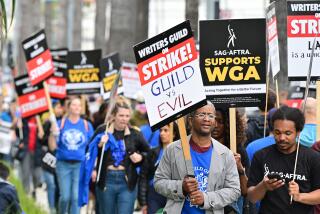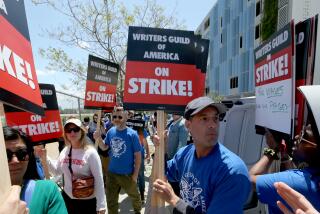222,000 Californians facing loss of jobless benefits
SACRAMENTO — About 222,000 Californians will be dropped from the state’s unemployment insurance rolls Saturday in what is shaping up to be a rough start to 2014 for the nation’s long-term jobless.
Congress went home for the holidays without approving a federally funded extension of jobless benefits for about 1.3 million Americans who have been out of work six months or longer. And Republicans, who control the House, are showing little inclination to take up the measure when lawmakers return Jan. 7.
For unemployed Californians, the cutoff caps a year made more difficult by the state’s Employment Development Department, which has been struggling since September with a botched upgrade of its aging computer systems. Payments to tens of thousands of unemployed workers have been delayed, sometimes for months. EDD workers are still processing many claims by hand, reducing the staff available to answer phone calls from frustrated clients.
As if those troubles weren’t enough, the state’s unemployment insurance fund is broke and there’s no solid plan to fund it. California owes the federal government $9 billion it borrowed to pay benefits during the recession. So far, politicians in Sacramento haven’t reached an agreement on how to repay those funds. Options include raising taxes on employers, cutting benefits to the unemployed or some combination of both.
“It’s been the most challenging year in decades,” said Maurice Emsellem, the co-policy director for the National Employment Law Project in Oakland, which advocates for the poor and working poor. “And the irony is that claims are down. Fewer workers are collecting benefits, but [EDD workers] are having a harder time processing claims. People are falling through the cracks and having a harder time than ever getting through to the system.”
Currently, about 712,000 Californians are receiving unemployment benefits, down from 1.5 million at the peak of the recession. The jobless rate, now at 8.5%, has been falling as the economy picks up steam and California companies add jobs.
But California has about 400,000 fewer jobs than it did before the downturn, and times are still tough for many of the state’s long-term unemployed.
Kaitlyn Smith, 24, of Twentynine Palms will lose her $450-a-week benefit when the federal extension expires this weekend. A Marine Corps veteran and the mother of two young children, Smith says she has been searching for work, but it’s hard to come by in the high desert. The family can’t move because her husband, a veteran of the Afghanistan and Iraq wars, must remain near the combat center until he’s discharged from the Marines in July.
The loss of her benefits will cut deeply into the couple’s income. Smith said the family is already skimping on basics, including heat, because the EDD has been behind on her payments.
“I have to keep the house at 55 degrees even though I have two little girls, ages 21/2 and 11/2,” Smith said. She said she has placed hundreds of calls to the EDD in the last few months, reaching an agent only once.
Unemployment benefits differ from state to state. In California, the state provides 26 weeks of assistance paid from employer taxes. Maximum weekly benefits are $450 in California, and the average payment is $305 a week. To be eligible, recipients have to regularly show proof that they are seeking employment.
After that, the federal government kicks in for the long-term jobless, who recently have been eligible to receive 37 weeks of benefits on top of the initial state help. These are being cut off Saturday.
According to the EDD, 28% of the state’s unemployed have been out of work for one year or more. Many are older workers, who often have difficulty getting rehired.
Robert Rowe, 55, is hoping to buck the odds. The Westlake Village resident has been unemployed since October, when he lost his job as an aerospace welder. He has been looking for work in construction and as a substance abuse counselor, but he hasn’t turned up anything so far.
Rowe said many employers “consider age, healthcare costs and longevity” when deciding to hire, putting veteran workers such as himself at a disadvantage. Still, he’s looking to a strengthening economy to help him land something after the holidays.
“It’s a little bit rougher,” Rowe said. “It’s not fun, but I’m persevering.”
Since June 2008, Congress has approved 11 extensions of unemployment benefits. At one point, the combination of state and federal assistance reached a maximum of 99 weeks in California.
The federal cutoff could have dire consequences for California’s slowly healing economy, Gov. Jerry Brown said this month. It “will have a ripple effect on the broader economy,” he warned in a Dec. 12 letter to congressional leaders.
The Employment Law Project estimated that the elimination of federal unemployment assistance would remove $4 billion from California’s economy next year.
Despite pressure from President Obama and top congressional Democrats, the Republican-controlled House of Representatives refused to extend federally funded assistance when it passed a $1-trillion budget bill Dec. 12. The Senate approved the same legislation six days later.
Republicans have cited a variety of reasons for not renewing the federal unemployment benefits. Sen. Rand Paul of Kentucky told NBC News this week that providing benefits to the long-term unemployed hurts their chances of getting rehired. He also said that Democrats should be willing to raise taxes to pay for continuing benefits instead of adding to the size of the federal budget deficit.
But supporters of additional long-term jobless benefits haven’t given up. Members in both houses have introduced measures that could be considered early next year to extend the federal unemployment program through the end of 2014.
In the meantime, the EDD has sent out letters to recipients of the federal aid, alerting them to Saturday’s cutoff and advising them to check the department’s website for updates at edd.ca.gov
The letters also highlighted a network of available job centers at americasjobcenter.ca.gov and a variety of other government and private social services.
The EDD, meanwhile, has been under attack for its failure to provide timely services to jobless Californians. Last month, the Assembly Insurance Committee took top agency officials to task during an oversight hearing. Unemployed workers testified that it was nearly impossible to reach an operator or caseworker, despite an expensive EDD upgrade of the telephone system.
EDD spokeswoman Loree Levy acknowledged that “we are not able to answer the phones the way we would like and our customers deserve.” She blamed the difficulty on federal budget cuts and staff reductions.
That’s little consolation to jobless Californians who are struggling to pay their bills.
Ted James LaDuca, an out-of-work graphic artist from San Francisco, said he qualified for unemployment benefits in early November. As of last week, he said he had received only two payments.
“Like so many others, I can’t seem to get in touch with anyone from EDD,” LaDuca said. “I feel so completely lost and hopeless over this.”
Twitter: @MarcLifsher







